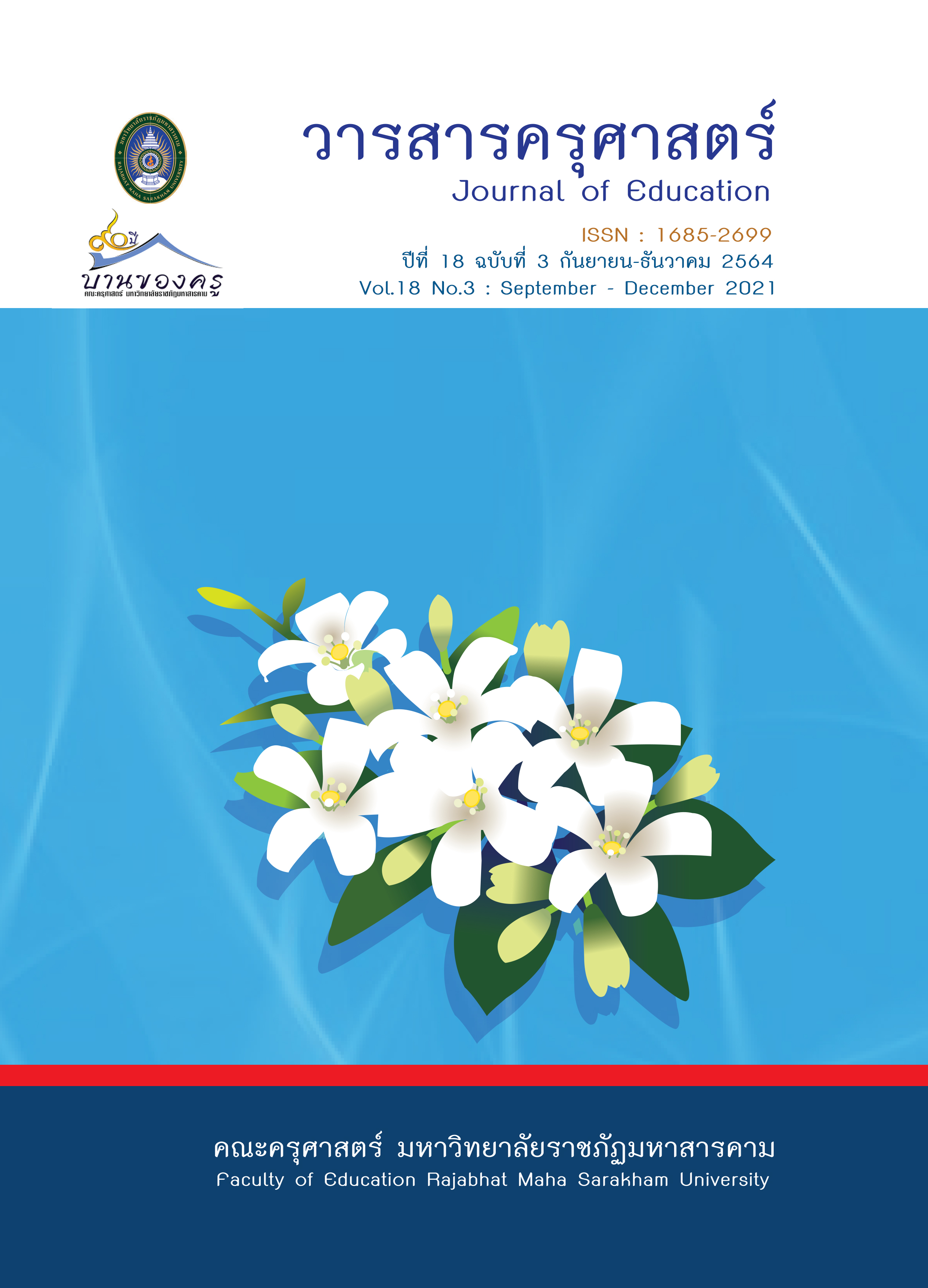Learning Activity Provision Through Literature-Based to Enhance Self-Awareness of Young Children
Main Article Content
Abstract
The purpose of this study was to investigate the effects of literature-based learning activities provision on self-awareness skills of young children. The target group was 8 young children in ages from 3 to 4 years old who were studying in Kindergarten level 1, Academic year 2020 at Anubandoembangnangbuat (Watthachang) School, Suphan Buri Primary Educational Service Area Office 3, Suphan Buri province. The research instrument were 1) 25 plans of literature-based learning activities provision to enhance self-awareness of young children and 2) Observation form on self-awareness behaviors of young children in 4 aspects: the expression of preference, aptitude, and self-efficacy, The expression of acceptance of differences between oneself and others, The expression of self-worth and others, and the expression of self-confidence. The data were analyzed using mean, standard deviation, and content analysis.
The results of this study indicated that after the implementation of literature-based learning activities, young children had higher mean self-awareness score than before the implementation in both overall and individual aspects. The highest mean score was on the expression of preference, aptitudes, and abilities. The largest difference in behavioral changes was on the expression of self-esteem and other-esteem. The lowest difference in behavioral changes was on the expression of acceptance of differences between oneself and others.
Article Details

This work is licensed under a Creative Commons Attribution-NonCommercial-NoDerivatives 4.0 International License.
ข้อกำหนดเบื้องต้นที่ผู้นิพนธ์(ผู้ส่งบทความ) ควรทราบ
1. ผู้นิพนธ์ที่ประสงค์จะลงตีพิมพ์บทความกับวารสาร ตั้งแต่เดือนมกราคม 2563 เป็นต้นไป ให้ใช้รูปแบบใหม่ (Template 2563) โดยสามารถดูตัวอย่างได้ที่เมนู GUIDELINES
2. จะตีพิมพ์และเผยแพร่ได้ ต้องผ่านการประเมินจากผู้ทรงคุณวุฒิ (Peer Review)
3. การประเมินบทความโดยผู้ทรงคุณวุฒิ (Peer Review) เป็นแบบ Double Blind
4. การอ้างอิงบทความใช้หลักเกณฑ์ APA (American Psychological Association) คลิก
5. บทความถูกปฏิเสธการตีพิมพ์ ไม่ผ่านการประเมิน ผู้นิพนธ์ขอยกเลิกเองหรือชำระเงินก่อนได้รับการอนุมัติ ทางวารสารไม่มีนโยบายการคืนเงิน
References
กระทรวงศึกษาธิการ. (2560). หลักสูตรการศึกษาปฐมวัย พุทธศักราช 2560. โรงพิมพ์ชุมนุมสหกรณ์การเกษตรแห่ง
ประเทศไทย จำกัด.
กมลวรรณ ศรีสำราญ. (2562). ผลการใช้กิจกรรมเล่นวัสดุสร้างสรรค์อย่างมีจุดหมายที่มีต่อการตระหนักรู้และเข้าใจ
ตนเองของเด็กปฐมวัย. คณะศึกษาศาสตร์ มหาวิทยาลัยเกษตรศาสตร์.
กุณฑลี จริยาปยุกต์เลิศ และคณะ. (2540). รายงานผลการวิจัย การใช้กิจกรรมกลุ่มสัมพันธ์เพื่อพัฒนามโนภาพแห่งตน
ของนักเรียนมัธยมศึกษาตอนต้น. คณะพยาบาลศาสตร์ มหาวิทยาลัยบูรพา.
ณัฐฐาศิริ ศักดิ์ทอง. (2548). ผลของการใช้วรรณกรรมสำหรับเด็กที่มีต่อทักษะชีวิตของเด็กวัยอนุบาล {วิทยานิพนธ์
ปริญญาครุศาสตรมหาบัณฑิต ไม่ได้ตีพิมพ์]. จุฬาลงกรณ์มหาวิทยาลัย.
ดารารัตน์ ทัพโต. (2554). การพัฒนาคุณธรรมจริยธรรมด้านความมีวินัยในตนเองสำหรับเด็กปฐมวัยโดยใช้วรรณกรรม
เป็นฐาน {วิทยานิพนธ์ปริญญาการศึกษามหาบัณฑิต ไม่ได้ตีพิมพ์]. มหาวิทยาลัยบูรพา.
ธันยา พิทธยาพิทักษ์. (2553). การพัฒนากระบวนการเรียนการสอนโดยบูรณาการทฤษฎีสหบทและแนวการสอนอ่านโดย
ใช้วรรณกรรมเป็นฐานเพื่อเสริมสร้างความสามารถในการอ่านเชิงสร้างสรรค์ของเด็กอนุบาล {วิทยานิพนธ์ปริญญา
ครุศาสตรดุษฎีบัณฑิต ไม่ได้ตีพิมพ์}. จุฬาลงกรณ์มหาวิทยาลัย.
นฤมล เนียมหอม. (2561, 26 พฤศจิกายน). การจัดกิจกรรมการเรียนรู้โดยใช้วรรณกรรมเป็นฐาน.
http://www.nareumon.com/index.php?option=com_content&task=view&id=20&Itemid=51.
นภเนตร ธรรมบวร. (2549). ในประมวลสาระชุดวิชา การจัดประสบการณ์สำหรับเด็กปฐมวัย หน่วยที่ 3 ,หลักสูตรเพื่อ
พัฒนาเด็กปฐมวัย. มหาวิทยาลัยสุโขทัยธรรมาธิราช.
นาถยา คงขาว. (2559). ผลการศึกษากลุ่มแบบอัตถิภาวะนิยมต่อการตระหนักรู้ในตนเองของนักเรียนชั้นมัธยมศึกษา
ตอนต้น {วิทยานิพนธ์วิทยาศาสตรมหาบัณฑิต ไม่ได้ตีพิมพ์}. มหาวิทยาลัยบูรพา.
นิตยา บุญเมือง. (2550). ผลการจัดประสบการณ์การเรียนรู้แบบโครงการที่มีต่อพฤติกรรมทางสังคมของเด็กปฐมวัย.
{วิทยานิพนธ์ปริญญาครุศาสตรมหาบัณฑิต ไม่ได้ตีพิมพ์}. มหาวิทยาลัยราชภัฏเพชรบุรี.
เนตรชนก รักกาญจนันท์. (2556). การจัดประสบการณ์การเรียนรู้โดยใช้วรรณกรรมเป็นฐานเพื่อเสริมสร้างทักษะทาง
สังคมของเด็กปฐมวัย {วิทยานิพนธ์ปริญญาศึกษาศาตรมหาบัณฑิต ไม่ได้ตีพิมพ์]. มหาวิทยาลัยศิลปากร.
นันทนา ธรรมบุศก์. (2540). การพัฒนาประสิทธิภาพในการทำงาน. วารสารแนะแนว, 31(166), 25 – 30.
บังอร ศรีกาล. (2553). ผลการพัฒนาทักษะทางภาษของเด็กปฐมวัยโดยใช้วรรณกรรมเป็นฐาน {วิทยานิพนธ์ปริญญา
การศึกษามหาบัณฑิต ไม่ได้ตีพิมพ์}. มหาวิทยาลัยมหาสารคาม.
พัชรี ผลโยธิน. (2560). เรื่องที่ 1.2.2 แนวคิดจากทฤษฎีด้านพัฒนาการและการเรียนรู้ในเอกสารการสอนชุดการจัด
การศึกษาและหลักสูตรสำหรับเด็กปฐมวัย. (น. 28-29). มหาวิทยาลัยสุโขทัยธรรมาธิราช สาขาวิชาศึกษาศาสตร์.
สิริมา ภิญโญอนันตพงษ์. (2550). เอกสารการสอนชุดวิชา ECED 201. สาขาวิชาการศึกษาปฐมวัย, มหาวิทยาลัยสวนดุสิต.
สำนักงานคณะกรรมการการศึกษาขั้นพื้นฐาน. (2554). แนวทางการพัฒนาทักษะชีวิต บูรณาการเรียนการสอน 8 กลุ่ม
สาระการเรียนรู้หลักสูตรแกนกลางการศึกษาขั้นพื้นฐาน พุทธศักราช 2551. โรงพิมพ์ชุมนุมสหกรณ์การเกษตรแห่ง
ประเทศไทย จำกัด.
Adele, B.L. (2005). The EQ Difference : A Powerful Plan for Putting Emotional Intelligence to work. America.
Amoriggi, H.D. (1981). The effect of storytelling on young children’s Sequencing ability. Dissertation Abstracts
International, 49(6): 1366A-1367A.
Bandura. (1986). Social Learning Theory.https://he01.tcithaijo.org/index.php/JRTAN/article/download/185482/145536/.
Bloom, B.S. (1956). Stability and Change in Human Characteristics. John Wiley and Son.
Bromley, K.D. (1992). Language arts: Exploring connections. 2nd ed., Allyn and Bacon.
Bruner, J.S. (1956). Bruner theory of cognitive development stages. https://www.firstdiscoverers.co.uk/jerome-
bruner-child-development-theories/
Casel. (2020). Social-Emotional Skills. https://casel.org/fundamentals-of-sel/.
Coenett, C.E. (2003). Creating meaning Throught Literature and the arts: an integration resource for classroom
teachers. Merrill Prentice-Hall.
Gibbs, G. (1988). Learning by doing: A Guide to Teaching ang Learning Methods.
https://scirp.org/reference/referencespapers.aspx?referenceid=478921.
Goleman, D. (1998). Working with Emotionnal Intelligence. Bantam Book.
Hillman, J. (1995). Discovering Children’s Literature. Prentice-hell.
Massachusetts Department of Elementary and Secondary Education. (2015). Massachusetts Standards for Preschool
and Kindergarten Social and Emotional Learning, and Approaches to Play and Learning.
https://www.mass.gov/service-details/preschool-and-kindergarten-standards-in-social-emotional- .
development-and-approaches.
Ministry of Education Singapore. (2013). Nurturing Early Learner A Curriculum for Kingdergartens in Singapore :
Social and Emotional Development. https://www.moe.gov.sg/preschool/curriculum.
Piaget, J. (1896). Piaget's Stages of Cognitive Development. https://www.simplypsychology.org/piaget.html.
Thorndike, E. L. (1898). Animal intelligence: An experimental study of the associative processes in
animals. Psychological Monographs: https://www.simplypsychology.org/edward-thorndike.html.
Weisinger, H. (1998). Emotional intelligence at work : The untapped edge of success. San Francisco : Jossey-Bass.
Whitehead, R. (1968). Childrens Literature : strategies of teacher. Prentice – Hall.


